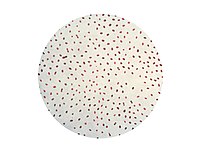
Photo from wikipedia
BackgroundBrucellosis, a neglected tropical food-borne zoonotic disease, has a negative impact on both animal and human health as well as tremendous socio-economic impact in developing countries where rural income relies… Click to show full abstract
BackgroundBrucellosis, a neglected tropical food-borne zoonotic disease, has a negative impact on both animal and human health as well as tremendous socio-economic impact in developing countries where rural income relies largely on livestock breeding and dairy products. It is endemic in the animal population in Nigeria and is a recognized occupational hazard. This work was done to establish the sero-prevalence and predisposing factors of food animals in Abuja, Nigeria to Brucella infection.ResultsOf 376 cattle, 203 sheep and 260 goats screened, 21 (5.6%); 19 (9.4%); 51 (19.6%) were positive, respectively for brucellosis with Rose Bengal Plate Test, and 2 (0.5%); 4 (2.0%); 10 (3.8%), respectively with c-ELISA. The likelihood of acquiring Brucella infection was higher among the Red Sokoto breed of goats compared to other breeds of goats (p = 0.05).ConclusionThis study showed that the prevalence of Brucella infection was low in food animals slaughtered at abattoirs in Abuja. However, of all animals screened, seropositivity to Brucella infection was highest in goats with Red Sokoto breed of goats more likely to acquire the disease when compared to other breeds.
Journal Title: BMC Research Notes
Year Published: 2017
Link to full text (if available)
Share on Social Media: Sign Up to like & get
recommendations!